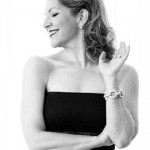By Rebecca Schmid
Fans of Joyce DiDonato may find it hard to fathom that one of today’s leading bel canto singers and Musical America’s Vocalist of the Year is just spreading her stardom to Germany. The Kansas native has sung only once at a Berlin opera house, performing Rosina in Il barbiere di Siviglia at the Deutsche Oper, and made her recital debut in the German capital last spring. Fortunately for us northerners, she is reversing the trend with a tour around her new album, Drama Queens (released on Virgin records). Together with the ensemble Il Complesso Barocco, she made the Konzerthaus Berlin her third stop on November 7 after traveling through the German cities of Baden-Baden and Bremen. The concert travels on to Hannover and Vienna before coming stateside.
DiDonato revisits a passion for baroque with this project, which compiles the arias of abandoned, forlorn and vengeful queens. The result plunges the listener into the tortured emotional world of a female archetype that provided the backbone of operas from Handel’s Giulio Cesare to Octavia by the little-known composer Reinhard Keiser, not to mention the many Italian composers who grounded the tradition. As DiDonato explained at the end of the recital, credit goes to Il Complesso Barocco founder Alan Curtis for spending “a lot of time in dusty libraries.” The conductor, apparently conserving his energy, was not present for the Berlin concert and ceded direction to the concert master Dmitry Sinkovksy.
The somewhat bare stage of the Konzerthaus’ main hall contrasted with DiDonato’s regal appearance in a red corset dress by Vivienne Westwood, which expanded into a full-scale bustle for the second half of the concert. The program, at least from a dramaturgical perspective, seamlessly alternated arias selected from Drama Queens with instrumental interludes. While the singer appeared somewhat nervous sitting onstage during a Scarlatti Sinfonia which proceeded her opening, a sensual account of the Cesti aria “Intorno all’idol mio,” she immediately abandoned herself to the role of the spurned queen Ottavia upon rising for the Monteverdi aria “Disprezzata regina.” The original instruments of Il Complesso Barocco underscored her mix of self-pity and rage with groaning textures.
One of DiDonato’s most powerful moments emerged in “Piangerò la sorte mia” from Handel’s Giulio Cesare. DiDonato’s powers of expression easily rise to the ranks of singers such as Beverly Sills and Cecilia Bartoli who have championed this role. The nearly choked timbre of her perfectly restrained pianissimo in the da capo section reached the tear jerking point with a break in accompaniment on the final line “finché vita…in petto avrò” (as long…as I have life in my breast). She brought the same dramatic depth and technical control, trilling precisely in time with Sinkovksy, to a more rare musical gem, the Giacomelli aria “Sposa, son disprezzata,” in which the Princess Irene of Trebisond laments her unfaithful husband (not an uncommon sentiment in this compilation).
The aria “Madre diletta, abbraciami” by the Venetian Giovanni Porta’s Ifgenia in Aulide emerged with lyricism perfectly sul filo from DiDonato and elegant phrasing from Sinkovksy, who savoured his melodies increasingly as the evening unfolded. His performance was at its best in Vivaldi’s “Pisendel” Concerto as his baroque violin seemed to weep in the slow inner movement. The Orlandini aria “Da torbida procella,” the opening track of Drama Queens, followed smoothly with its propulsive, storm-tossed textures evoking the Queen Berenice’s infatuation with the Emperor Titus.
DiDonato closed the concert with “Brilla nell’alma” from Handel’s Alessandro, an especially compelling number in the German composer’s artful assimilation of what the album’s program notes explain was the newly fashionably Neapolitan style with its static chordal accompaniment. As on recording, DiDonato soared through rapid coloratura runs that capture Rossane’s glee in having pinned down Alexander the Great and gave a purely instrumental cadenza, audibly shaped by the natural sounds of Il Complesso Barocco.
As a first encore, DiDonato offered the melancholic aria “Lasciami piangere” from Keiser’s Octavia, joking that Obama’s re-election allowed her to express the protagonist’s wish to cry and die in solitude without actually having to mean it. The following account of Berenice’s vengeful aria “Col versar, barbaro, il sangue,” in which the Queen threatens suicide upon the Emperor’s announcement that he won’t marry a woman of non-Roman heritage, brought the group together with even more electric energy than in the body of the concert. The audience was clearly smitten by her natural thespian presence. A reprisal of “Da torbida procella” ended the evening on a more uplifting note in matters of imperial love.
Tags: Alan Curtis, Cesti, Dmitry Sinkovksy, Drama Queens, Handel, Il Complesso Barocco, Joyce DiDonato, Keiser, Konzerthaus Berlin, Porta, Virgin records, Vivaldi

